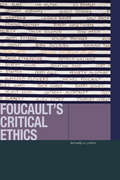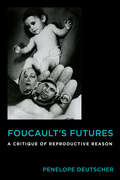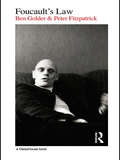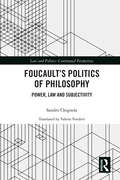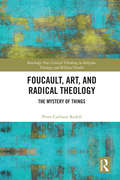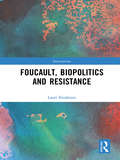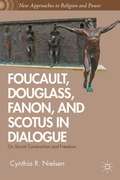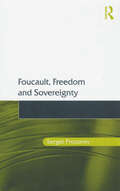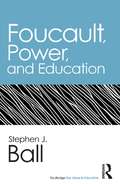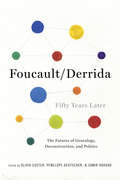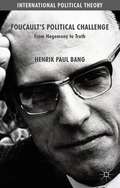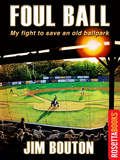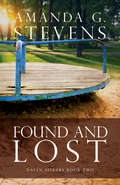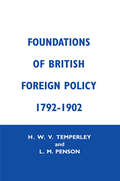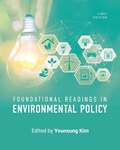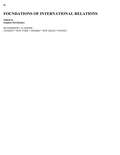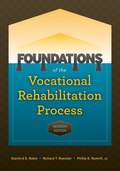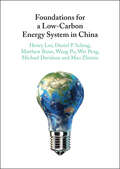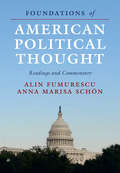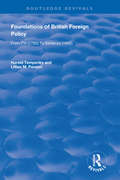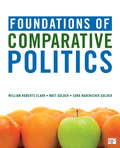- Table View
- List View
Foucault's Critical Ethics (Just Ideas)
by Richard A. LynchThe central thesis of Foucault’s Critical Ethics is that Foucault’s account of power does not foreclose the possibility of ethics; on the contrary, it provides a framework within which ethics becomes possible. Tracing the evolution of Foucault’s analysis of power from his early articulations of disciplinary power to his theorizations of biopower and governmentality, Richard A. Lynch shows how Foucault’s ethical project emerged through two interwoven trajectories: analysis of classical practices of the care of the self, and engaged practice in and reflection upon the limits of sexuality and the development of friendship in gay communities. These strands of experience and inquiry allowed Foucault to develop contrasting yet interwoven aspects of his ethics; they also underscored how ethical practice emerges within and from contexts of power relations. The gay community’s response to AIDS and its parallels with the feminist ethics of care serve to illustrate the resources of a Foucauldian ethic—a fundamentally critical attitude, with substantive (but revisable) values and norms grounded in a practice of freedom.
Foucault's Futures: A Critique of Reproductive Reason (Critical Life Studies)
by Penelope DeutscherIn Foucault's Futures, Penelope Deutscher reconsiders the role of procreation in Foucault's thought, especially its proximity to risk, mortality, and death. She brings together his work on sexuality and biopolitics to challenge our understanding of the politicization of reproduction. By analyzing Foucault's contribution to the politics of maternity and its influence on the work of thinkers such as Roberto Esposito, Giorgio Agamben, and Judith Butler, Deutscher provides new insights into the conflicted political status of reproductive conduct and what it means for feminism and critical theory.
Foucault's Law
by Ben Golder Peter FitzpatrickFoucault’s Law is the first book in almost fifteen years to address the question of Foucault’s position on law. Many readings of Foucault’s conception of law start from the proposition that he failed to consider the role of law in modernity, or indeed that he deliberately marginalized it. In canvassing a wealth of primary and secondary sources, Ben Golder and Peter Fitzpatrick rebut this argument. They argue that rather than marginalize law, Foucault develops a much more radical, nuanced and coherent theory of law than his critics have acknowledged. For Golder and Fitzpatrick, Foucault’s law is not the contained creature of conventional accounts, but is uncontainable and illimitable. In their radical re-reading of Foucault, they show how Foucault outlines a concept of law which is not tied to any given form or subordinated to a particular source of power, but is critically oriented towards alterity, new possibilities and different ways of being. Foucault’s Law is an important and original contribution to the ongoing debate on Foucault and law, engaging not only with Foucault’s diverse writings on law and legal theory, but also with the extensive interpretive literature on the topic. It will thus be of interest to students and scholars working in the fields of law and social theory, legal theory and law and philosophy, as well as to students of Foucault’s work generally.
Foucault's Politics of Philosophy: Power, Law, and Subjectivity (Law and Politics)
by Sandro ChignolaOriented around the theme of a ‘politics of philosophy’, this book tracks the phases in which Foucault’s genealogy of power, law, and subjectivity was reorganized during the 14 years of his teaching at the College de France, as his focus shifted from sovereignty to governance. This theme, Sandro Chignola argues here, is the key to understanding four features of Foucault’s work over this period. First, it foregrounds its immediate political character. Second, it demonstrates that Foucault’s "Greek trip" also aims at a politics of the subject that is able to face the processes of the governmentalization of power. Third, it makes clear that the idea of the "government of the self" is – drawing on an ethics of intellectual responsibility that is Weberian in origin – an answer to the processes that, within neoliberal governance, produce the subject as an individual (as a consumer, a market agent, an entrepreneur, and so on). Fourth, the theme of a ‘politics of philosophy’ implies that Foucault’s research was never simply scholarly or neutral; but rather was characterized by a specific political position. Against recent interpretations that risk turning Foucault into a scholar, here then Foucault is re-presented as a key figure for jurisprudential and political-philosophical research.
Foucault, Art, and Radical Theology: The Mystery of Things (Routledge New Critical Thinking in Religion, Theology and Biblical Studies)
by Petra Carlsson RedellMichel Foucault wrote prolifically on many topics including, art, religion, and politics. He also eloquently articulated how power structures are formed and how they also might assist resistance and emancipation. This book uses the hermeneutical lens of Foucault’s writings on art to examine the performative, material, and political aspects of contemporary theology. The borderland between philosophy, theology, and art is explored through Foucault’s analyses of artists such as Diego Velázquez, Édouard Manet, René Magritte, Paul Rebeyrolle, and Gerard Fromanger. Here special focus is placed on performativity and materiality—or what the book terms the mystery of things. At successive junctures, the book discovers a postrepresentational critique of transcendence; an enigmatic material sacramentality; playful theopolitical accounts of the transformative force of stupidity and nonsense; and political imagery in motion enabling theological interpretations of contemporary collectives such as Pussy Riot and the Sisters of Perpetual Indulgence. In conversation with contemporary thinkers including Catherine Keller, Louise-Marie Chauvet, John Caputo, Daniel Barber, Mark C. Taylor, Jeffrey W. Robbins, and Mattias Martinson, the book outlines this source of inspiration for contemporary radical theology. This is a book with a fresh and original take on Foucault, art, and theology. As such, it will have great appeal to scholars and academics in theology, religion and the arts, the philosophy of religion, political philosophy, and aesthetics.
Foucault, Biopolitics and Resistance (Interventions)
by Lauri SiisiäinenPolitical resistance is flourishing. In this context, there is a growing interest to reread Michel Foucault’s work, especially from the late period, from the perspective of resistance, social movements and affirmative biopolitics. Yet what has been missing so far is a book-length, comprehensive study focusing on this topic. This volume undertakes this task, providing an original typology of the resources of resistance discovered in Foucault’s late thinking: resistance as discursive protection of autonomy bodily and affective resistance the strategies, arts and practices of affirmative biopolitics or ‘politics of life’ The book shows how these different types of tools, arts and practices can be used in resistant politics, in struggles against various regimes and institutions of power and government, so that they mutually supplement and reinforce one another. The author embarks on advancing Foucault’s insights on resistance from where he stopped. Furthermore, the volume proposes a novel assessment of the Foucauldian political toolkit in the 21st century context, addressing its pertinence for struggles against neoliberalism and post-Fordist capitalism. Foucault, Biopolitics and Resistance will be an important resource for students and scholars interested in Foucault, resistance and 21st century politics within many fields, including political science, international relations, contemporary and continental philosophy as well as sociology. The work elaborates fresh methodological insights, fruitful for further empirical research on social and political movements.
Foucault, Douglass, Fanon, and Scotus in Dialogue
by Cynthia R. NielsenThrough examining Douglass's and Fanon's concrete experiences of oppression, Cynthia R. Nielsen demonstrates the empirical validity of Foucault's theoretical analyses concerning power, resistance, and subject-formation. Going beyond merely confirming Foucault's insights, Douglass and Fanon expand, strengthen, and offer correctives to the emancipatory dimensions of Foucault's project. Unlike Foucault, Douglass and Fanon were not hesitant to make transhistorical judgments condemning slavery and colonization. Foucault's reticence here signals a weakness in his account of human being. This weakness sets him at cross-purposes not only with Scotus, but also with Douglass and Fanon. Scotus's anthropology provides a basis for transhistorical moral critique; thus he is a valuable dialogue partner for those concerned about social justice and human flourishing.
Foucault, Freedom and Sovereignty
by Sergei ProzorovAgainst the prevailing interpretations which disqualify a Foucauldian approach from the discourse of freedom, this study offers a novel concept of political freedom and posits freedom as the primary axiological motif of Foucault's writing. Based on a new interpretation of the relation of Foucault's approach to the problematic of sovereignty, Sergei Prozorov both reconstructs ontology of freedom in Foucault's textual corpus and outlines the modalities of its practice in the contemporary terrain of global governance. The book critically engages with the acclaimed post-Foucauldian theories of Giorgio Agamben and Antonio Negri, thereby restoring the controversial notion of the sovereign subject to the critical discourse on global politics. As a study in political thought, this book will be suitable for students and scholars interested in the problematic of political freedom, philosophy and global governance.
Foucault, Power, and Education (Routledge Key Ideas in Education)
by Stephen BallFoucault, Power, and Education invites internationally renowned scholar Stephen J. Ball to reflect on the importance and influence of Foucault on his work in educational policy. By focusing on some of the ways Foucault has been placed in relation to educational questions or questions about education, Ball highlights the relationships between Foucault’s concepts and methods, and educational research and analysis. An introductory chapter offers a brief explanation of some of Foucault’s key concerns, while additional chapters explore ways in which Ball himself has sought to apply Foucault’s ideas in addressing contemporary educational issues. In this intensely personal and reflective text, Ball offers an interpretation of his Foucault—That is, his own particular reading of the Foucauldian toolbox. Ideal for courses in education policy and education studies, this valuable teaching resource is essential reading for any education scholar looking for a starting point into the literature and ideas of Foucault.
Foucault/Derrida Fifty Years Later: The Futures of Genealogy, Deconstruction, and Politics (New Directions in Critical Theory #12)
by Penelope Custer Olivia Deutscher Haddad SamirEarly in their careers, Michel Foucault and Jacques Derrida argued over madness, reason, and history in an exchange that profoundly influenced continental philosophy and critical theory. In this collection, Amy Allen, Geoffrey Bennington, Lynne Huffer, Colin Koopman, Pierre Macherey, Michael Naas, and Judith Revel, among others, trace this exchange in debates over the possibilities of genealogy and deconstruction, immanent and transcendent approaches to philosophy, and the practical and theoretical role of the archive.
Foucault’s Political Challenge
by Henrik Paul BangTracing increasing distrust of politicians and democratic institutions back to the negative idea of political power and freedom as always being a 'power over' and 'freedom from', this text examines Foucault's alternative conception of the politician as one who has the courage to tell people the truth about what has to be done in the face of the dangers they confront. Telling the truth is not sufficient, but must be complemented with empowering people to actively help in overcoming the dangers themselves. Breaking with conceptions of politics as hierarchy and anarchy, Foucault contended that where there is obedience, there cannot be truth and genuine freedom. This book offers a redefinition of power and freedom within a circular logic of true authority and self-governance. It argues that democracy cannot survive without being innovated along these lines, and considers what can be done to reconnect politicians and laypeople in order to rebuild their mutual trust in each other's political capacities.
Foul Ball: My Life And Hard Times Trying To Save An Old Ballpark (RosettaBooks Sports Classics)
by Jim BoutonA rollicking and &“compelling&” true story of baseball, big money, and small-town politics by the author of the classic Ball Four (Publishers Weekly). Host to organized baseball since 1892, Pittsfield, Massachusetts&’s Wahconah Park was soon to be abandoned by the owner of the Pittsfield Mets, who would move his team to a new stadium in another town—an all too familiar story. Enter former Yankee pitcher Jim Bouton and his partner with the best deal ever offered to a community: a locally owned professional baseball team and a privately restored city-owned ballpark at no cost to the taxpayers. The only people who didn&’t like Bouton's plan were the mayor, the mayor's hand-picked Parks Commissioners, a majority of the City Council, the only daily newspaper, the city&’s largest bank, its most powerful law firm, and a guy from General Electric. Everyone else—or approximately 98% of the citizens of Pittsfield—loved it. But the &“good old boys&” hated Bouton&’s plan because it would put a stake in the heart of a proposed $18.5 million baseball stadium—a new stadium that the citizens of Pittsfield had voted against three different times. In this riveting account, Bouton unmasks a mayor who brags that &“the fix is in,&” a newspaper that lies to its readers, and a government that operates out of a bar. But maybe the most incredible story is what happened after Foul Ball was published—a story in itself. Invited back by a new mayor, Bouton and his partner raise $1.2 million, help discover a document dating Pittsfield&’s baseball origins to 1791, and stage a vintage game that&’s broadcast live by ESPN-TV. Who could have guessed what would happen next? And that this time it would involve the Massachusetts Attorney General? &“An irresistible story whose outcome remains in doubt until the very end. Not just a funny book, but a patriotic one.&”—San Francisco Chronicle &“Bouton proves that a badly run city government can be just as dangerous—and just as hilarious—as a badly run baseball team.&”—Keith Olbermann
Found and Lost
by Amanda G. StevensWhen Violet DuBay's friend Khloe confides that her dad is a Christian, it's the one secret Violet can't keep. Turning in Khloe's dad to the Constabulary is her duty. Her decision becomes an opportunity to infiltrate the Christian resistance; but as she gets to know Marcus, Lee, and the others, she's compelled to question the things her society has taught her about God and His followers. Clay Hansen persuades his family to join him at an underground church meeting and brings Violet, his teen daughter Khloe's best friend. That night, the church is raided. He and his wife escape, but in the chaos, he loses Violet and Khloe. How can he find them with the Constabulary monitoring his every move? If the God who once spared Khloe won't intervene, Clay will have to save her himself.
Foundation of British Foreign Policy: 1792-1902
by H.W.V. Temperley Lillian M. PensonFirst published in 1966. This volume represents a selection by the Editors of unpublished and published documents dealing with foreign affairs, from the rise of the Younger Pitt (1792) to the death of Salisbury (1902). It contains both official papers and private letters; speeches and other public statements of policy.
Foundational Readings in Environmental Policy
by Younsung KimThrough an enlightening collection of academic articles, Foundational Readings in Environmental Policy deepens and broadens students' knowledge of the root cause of environmental policy and also provides suggested solutions to mitigate environmental impacts. Students are encouraged to better understand the complex nature of environmental issues, today's environmental policy approaches, and technologies and approaches that can create a more sustainable future. The anthology is organized into the units. Unit I covers the fundamental principles of environmental policy and politics. The readings explore the main features of environmental policy, how it differs from public policy, how policy is formed, the key actors involved in implementing policies, and more. Unit II outlines environmental issues beyond geographic boundaries and which are not limited to the natural/ecological realm. The readings focus on climate change, energy, and biodiversity loss. The final unit discusses emerging environmental issues and policy approaches, including environmental inequality, waste management, sustainable businesses, issues related to energy access in developing countries, and strategies for the future. Filling a gap in the current literature, Foundational Readings in Environmental Policy is an ideal resource for courses and programs in environmental policy.
Foundations Of International Relations
by Stephen McGlincheyAn engaging introduction to the core concepts, theories, actors and issues in global politics. Featuring a combination of chapters authored by leading scholars, researchers and practitioners from around the world, this textbook takes into account the historical development of international relations and the web of dynamics that forms the subject, resulting in a clear analysis of the field from a variety of perspectives. Chapters cover topics including race, colonialism, gender, sexuality, digital globalization, the environment and security studies and are supported by a range of case studies, key boxes and illustrative material to aid students in their practical application of theoretical ideas. The book is also complimented by a bespoke curated website, featuring a regularly updated collection of interactive learning material and hosted on E-International Relations, the world's leading open access IR website. Portraying the most compelling issues of our time, and presenting the necessary tools to analyse and debate the subject, this is an invaluable resource for anyone studying international relations.
Foundations Of Political Obligation
by Dr S. R. MyneniFoundations of Political Obligation by Dr. S. R. Myneni provides a comprehensive exploration of the moral, legal, and philosophical underpinnings of why individuals owe obedience to the state. It delves into the nature, characteristics, and classifications of political obligation, including the distinction between moral and legal, positive and negative, and universal and particular obligations. The book examines classical and modern theories of political obligation, highlighting perspectives from thinkers like Hobbes, Locke, Rousseau, T.H. Green, Marx, and Gandhi. It also discusses the legitimacy of power, civil disobedience, obedience to unjust laws, the role of punishment, and the duties of citizens as enshrined in the Indian Constitution. With insights into ancient and modern political thought, including utilitarian and idealistic theories, the book offers a rich analytical framework for understanding the relationship between the individual and the state in both legal and ethical dimensions. It serves as a vital resource for students of political science and law.
Foundations Of The Vocational Rehabilitation Process
by Richard Roessler Stanford E. Rubin Phillip D. RumrillThe seventh edition of Foundations of the Vocational Rehabilitation Process provides historical, philosophical, legislative, and sociological foundations for the habilitation/rehabilitation of persons with disabilities. A thorough and current introduction to the American vocational rehabilitation process, this edition addresses mandates presented in the current major pieces of disability legislation influencing the practice of rehabilitation.This book presents theoretical and practical assistance in translating those mandates into positive action. It is this dual process of individual and environmental proactivity that can maximize the rehabilitation of disabled individuals. Not just for the dedicated rehabilitation counselor, this book is also for students attending an introductory course at the master's- or senior-level and in-service directors who design informative training programs. New in the seventh edition:Updated chapter on how "The Americans with Disabilities Act" (ADA), as amended in 2008, prohibits discrimination on the basis of disability in employment, public services, accommodations, and telecommunications. Updated section on the right to medical treatment in light of the 2012 "Affordable Care Act" (ACA). New information and updated references were added on the five disability types--physical disabilities, emotional disorders, intellectual disabilities, learning disabilities, and visual impairments and blindness. Now includes more than 1300 references, 300 of which are new.
Foundations for a Low-Carbon Energy System in China
by Michael Davidson Henry Lee Matthew Bunn Wei Peng Daniel P. Schrag Wang Pu Mao ZhiminClimate change is a key problem of the 21st century. China, as the largest emitter of greenhouse gases, has committed to stabilize its current emissions and dramatically increase the share of electricity production from non-fossil fuels by 2030. However, this is only a first step: in the longer term, China needs to aggressively strive to reach a goal of zero-emissions. Through detailed discussions of electricity pricing, electric vehicle policies, nuclear energy policies, and renewable energy policies, this book reviews how near-term climate and energy policies can affect long-term decarbonization pathways beyond 2030, building the foundations for decarbonization in advance of its realization. Focusing primarily on the electricity sector in China - the main battleground for decarbonization over the next century – it provides a valuable resource for researchers and policymakers, as well as energy and climate experts.
Foundations of Agnostic Statistics
by Peter M. Aronow Benjamin T. MillerReflecting a sea change in how empirical research has been conducted over the past three decades, Foundations of Agnostic Statistics presents an innovative treatment of modern statistical theory for the social and health sciences. This book develops the fundamentals of what the authors call agnostic statistics, which considers what can be learned about the world without assuming that there exists a simple generative model that can be known to be true. Aronow and Miller provide the foundations for statistical inference for researchers unwilling to make assumptions beyond what they or their audience would find credible. Building from first principles, the book covers topics including estimation theory, regression, maximum likelihood, missing data, and causal inference. Using these principles, readers will be able to formally articulate their targets of inquiry, distinguish substantive assumptions from statistical assumptions, and ultimately engage in cutting-edge quantitative empirical research that contributes to human knowledge.
Foundations of American Political Thought: Readings and Commentary
by Alin Fumurescu Anna Marisa SchönAmerican political thought was shaped by a unique combination of theoretical influences: republicanism, liberalism, and covenant theology. This reader shows how these influences came together. Organized chronologically from the Puritans' arrival in the New World to the Civil War, each chapter includes carefully selected primary sources and substantial commentary to explain the historical context and significance of the excerpts. A coherent interpretative framework is offered by focusing the analysis on the different assumptions of the people - the republican understanding as a corporate whole and the liberal understanding as a multitude of individuals - that were intertwined during the founding. The book features, for the first time, two chapters on non-American authors, who capture the main tenets of republicanism and liberalism and were widely quoted in the era, as well as excerpts from lesser-known sources, including Puritan covenants, the first state constitutions, and Native American speeches.
Foundations of British Foreign Policy: 1792 – 1902 (Routledge Revivals)
by Lillian M. Penson Harold TemperleyFirst published in 1938, this volume represents a selection of unpublished and published documents dealing with foreign affairs, from the rise of the Younger Pitt to the death of Salisbury. It contains both official papers and private letters; speeches and other public statements of policy. The Editors have had access to a large number of unpublished materials, public and private, so that many of the documents that they have chosen are new and reveal a striking continuity of ideas in British diplomacy, despite opposed parties and even opposing policies.
Foundations of Canadian Political Behaviour: Stability and Change in the Twenty-First Century
by J. Scott Matthews Stuart Soroka Amanda BittnerFoundations of Canadian Political Behaviour aims to place contemporary Canadian electoral politics in comparative perspective, particularly with respect to its peers among the established democracies of western Europe and North America. The book pays tribute to political scientist Richard Johnston and his diverse contributions to the study of Canadian politics and electoral politics in general. Presenting original empirical research by leading Canadian and international scholars, the volume is organized around the three themes that animate Johnston’s nearly five decades of scholarship: the impact of electoral and party systems on political conflict, change and persistence in the social foundations of party competition, and the role of election campaigns in voting behaviour. Chapters utilize diverse approaches, including quantitative analysis of survey data and electoral statistics, experimentation, systematic analysis of media content, historical narrative, and critical conceptual analyses. The book is anchored in general theoretical concerns; half of the chapters centre on Canadian cases, while half highlight key comparators including the United States, Germany, and the United Kingdom.
Foundations of Comparative Politics
by Matt Golder Dr William Roberts Clark Sona N. GolderAdapted from the groundbreaking bestseller Principles of Comparative Politics, Third Edition! Foundations of Comparative Politics presents a scientific approach to the rich world of comparative inquiry, research, and scholarship, providing you a guide to cross-national comparison and why it matters. This condensed, more accessible format introduces you to the key questions in comparative politics, using brief insights from tools such as decision, social choice, and game theory to help you understand clearly why some explanations for political phenomena are stronger than others. Foundations concentrates on describing the core features of regimes and institutions and on analyzing how these fundamental attributes drive variation in the economic and political outcomes we care about most. This approach more closely replicates what comparative scholars do: constructing and testing theories on political phenomena over basic memorization of country-specific facts—to explain, rather than describe. Illustrated with current examples that show the application of theory, you will gain invaluable real-world skills in critical thinking and empirical analysis that you will carry with you long after the course is over.
Foundations of Comparative Politics
by Matt Golder Dr William Roberts Clark Sona N. GolderAdapted from the groundbreaking bestseller Principles of Comparative Politics, Third Edition! Foundations of Comparative Politics presents a scientific approach to the rich world of comparative inquiry, research, and scholarship, providing you a guide to cross-national comparison and why it matters. This condensed, more accessible format introduces you to the key questions in comparative politics, using brief insights from tools such as decision, social choice, and game theory to help you understand clearly why some explanations for political phenomena are stronger than others. Foundations concentrates on describing the core features of regimes and institutions and on analyzing how these fundamental attributes drive variation in the economic and political outcomes we care about most. This approach more closely replicates what comparative scholars do: constructing and testing theories on political phenomena over basic memorization of country-specific facts—to explain, rather than describe. Illustrated with current examples that show the application of theory, you will gain invaluable real-world skills in critical thinking and empirical analysis that you will carry with you long after the course is over.
